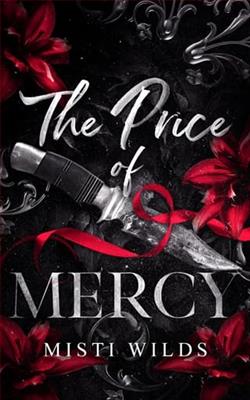Page 21 of The Marquis, the Minx, and the Mistletoe
The tarot cards were old, their edges gone smooth and glossy from the countless times they'd been thumbed through. Nana had bought them in Marseille on her honeymoon. She liked the pictures, she said, and she liked the mystique. She had given them to Tia, wrapped in a very fine velveteen scarf, on the day she had been sent to Bath-Spa for finishing school, for she had known how Tia had always loved them.
"Better than tea leaves," Tia would say, "much more communicative."
"If you say so, dear," Nana would reply, with her mysterious airy voice that implied everything one believed was actually just the opposite.
Every question Tia had asked about Sheldon Bywater tonight had been answered in a riddle. She drew the same cards over and over. Reversed towers, crumbling up into the sky in chunks of mortar and brick. An unattended feast under a tent supported by four wands. Seven cups, each holding a different gift, turned on their heads as though all manner of offerings would spill out into the ether.
"Cards," she said, as reasonably as she could, "I am asking about the man himself, not his housekeeping affairs."
Perhaps there was a hint in that reversed seven of cups. Many great offerings, of great variety, all rejected or missed by their recipient. She had drawn this card herself many times in her youth and throughout that first Season in London.
It had seemed to a younger Tia, all throughout her girlhood, that there were two manners of infatuation one might be struck with. The infatuations of the soul, wherein an elegant duke or a stately young heir fit all the requirements of one's perfect outcome, happened often enough. Rarer were the infatuations of the body, in which all sense and reason had fled in favor of some animalistic drive, which must be ignored just as the desire to sleep until luncheon or to eat an entire cake must be ignored.
The problem was with her infatuations of the soul. She would find a candidate for perfection, some shining golden beacon of manners and style, only to notice during a dance that the poor sod had greens stuck in his teeth or clammy hands or simply could not carry on a conversation, and suddenly, that hope and all the dreams therein attached would be dashed to dust under her feet.
She imagined suitors lined up in those cups, all upside down, tossing each one into a pile of rejections like an afternoon of scouring fabric samples for a new frock, each one flat and rumpled and forgotten.
Sheldon Bywater was, without a doubt, an infatuation of the body. Yes, he was a marquis. Yes, he was a decorated military man, and a hero of the realm. Yes, he knew the waltz and owned lands and had a prestigious education. But.
But.
It wasn't simply that he looked wrong, though of course burly and rugged features were not what one associated with nobility and grace. It was not only that he was so very large and imposing, nor that he had retained that gruff Scots brogue despite the very best English education. It wasn't even the big, ugly bat, which Tia found herself rather significantly softened toward since that story he'd told in the sitting room.
She had always been drawn to men who looked the way Sheldon did. Those infatuations of the body that would send a rush of heat and a gaggle of irrational thoughts into her head when she passed by a particularly stalwart gardener with his sleeves rolled to his elbows as he trimmed the hedge, or caught sight of a blacksmith swinging a hammer with his muscled arm in clear relief through the linen of his shirt, damp with the sweat of his labor.
Once, even, a Spanish dignitary came to a ball in Bath-Spa, a wonderful match for any ambitious young lady. Instead of using her charms on the dignitary that night, Tia had been unable to look away from the hulking and scarred presence of the Spaniard's bodyguard, who did nothing but lurk in a corner all night.
It was just like the cake, wasn't it? All people must resist baser temptations. That's what Mrs. Arlington had said.
But why wasn't Tia's particularly tempting flavor of cake more in line with her girlhood dreams? Why must everything be so ridiculously contrary? Why couldn't one simply decide what she wanted and have her instincts follow suit?
The cards were probably unclear because she had been too vague in her questioning. She hadn't asked, "How does Lord Moorvale feel about me?" or "Should I encourage this flirtation?" or "Am I ruining my life?"
She had just thought of him and wondered what was going through that mind of his all the time. Evidently, it was a lot of home and hearth. Maybe that meant marriage? Maybe. It might also have just meant he was building a new wing to his medieval castle.
His ancestor had thought the bat was a hawk. She couldn't help but chuckle again at the thought of it. He really was hopeless with illustration. Lady Somers had done an outline for him at the end and allowed him to color it in, and he had been grateful enough that she'd patted his head like a child to diffuse the abundance of his thanks.
She yawned, turning to reach for her glass of water, only to find the carafe was empty. How long had she been sitting here, staring at playing cards in the hopes of some epiphany?
She stretched her arms over her head, blinking herself back into the moment, tangled in the fluffy sheets of this gigantic bed, surrounded by endless reminders of the man who'd been at the edge of her thoughts for so long. No wonder she was ruminating so very persistently! How could she not in this room?
She flung her legs over the side of the bed, pushing them into the slippers she'd brought in her modest satchel of things from home, warm and woolen and well broken in, and reached for a dressing gown, which was most assuredly borrowed, one of Glory's concoctions in deep port wine color, embroidered along the sleeves with silver and black images of birds in flight.
She must clear her mind before she could sleep. Perhaps a cup of flower tea or a book from the library downstairs would do the job. Even just existing in a different room for a bit might help to settle her thoughts and discourage further obsessing. If nothing else, she could refill the carafe with water.
She had gotten so involved in her thoughts that she had left her hair unbound, the heat-created curls from the day now sagging and unraveling back into the sheet of pin-straight black that nature had given her. She enjoyed the feeling of having her hair down, no pins or pinching or pulling, and no weight all gathered in one tight spot. She often slept with it wild, rather than in a neat braid, for there was nothing but a new curling wand in the morning to return her hair to order anyhow.
She took the deck of cards, dropping them in the generously deep pocket of the dressing gown, where they sagged against her thigh. Perhaps her cards would read more clearly elsewhere, she thought. Perhaps it was this room that was confusing everything.
The shuffle of her old slippers whispered against the wooden floors as she tiptoed out of the room and drew the door carefully and silently shut. She always moved in the night as though her sisters were still sleeping alongside her, and she did not wish to wake them. Truthfully, she did not think there were any other bedrooms in this general vicinity in the gigantic Somerton estate, but all the same, one needn't slam a door when it could be shut quietly just as easily.
Perhaps such consideration spared a mouse in the wall or a bird on the window rail an unpleasant jolt awake, at the very least.
She stifled a giggle and wondered, idly, if all of those gangly puppies were asleep somewhere inside this house, or if they had a kennel outside, where they snuggled up atop one another for the night like a pile of brown-white velvet. The mother dog, Echo, was likely with her master, though Tia doubted there was another bed in this house large enough for both Lord Moorvale and that spectacular bloodhound.
She hoped to pass a clock as she went, simply to give her an idea of how long she'd delayed a good night's rest. The windows in the hall cast a dim glow of light into her path, surprisingly bright and navigable for this late hour. Ahead, Tia spotted a warmth, the glow of a lit fireplace radiating from an open door toward the end of her path.
Indeed, as she got closer, she saw that a low fire was crackling merrily along in a small den, where it appeared someone had recently abandoned a bottle of Scotch and a sticky glass near a pair of overstuffed armchairs. She found this scene reassuring, a sign that she was not the only sleepless one here.















